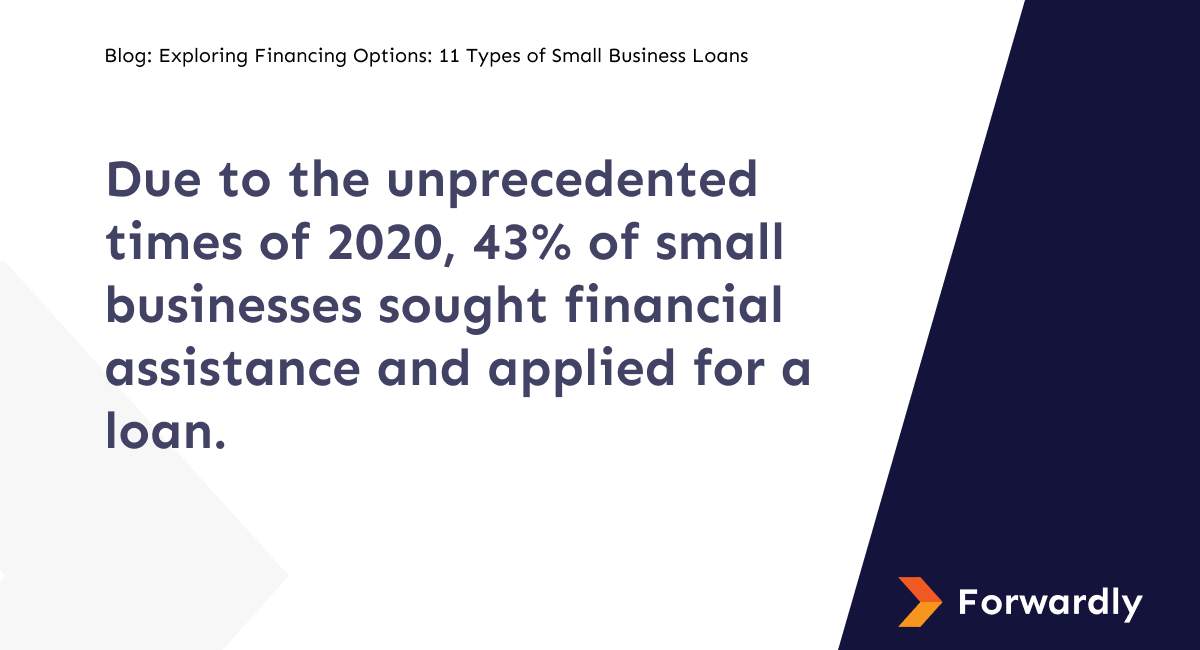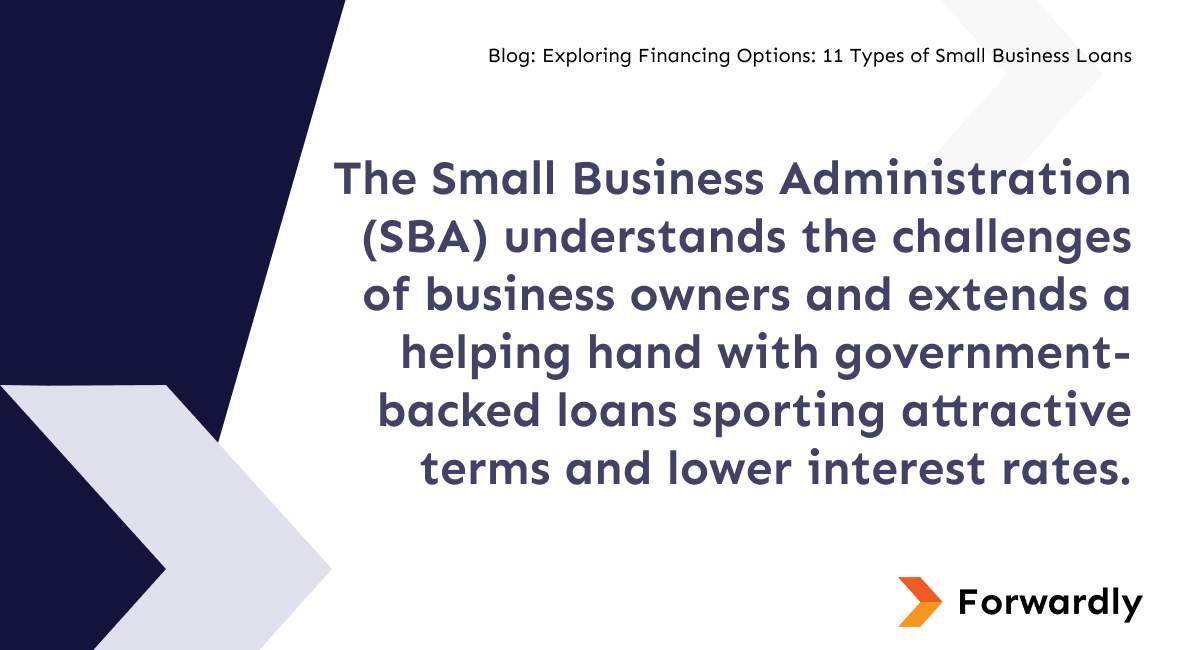We know that running a business is no small feat, and one of the keys to success often hinges on securing the right financing. Whether you’re a small business owner with big dreams or a seasoned entrepreneur looking to expand, access to capital can be the pivotal element you’ve been seeking. For many business owners, the journey through the loan process can be pretty intimidating, and there are several reasons. When it comes to launching and running a thriving business, financial stability is often the linchpin of businessfailure due to mismanagement of cash flow.
Many of us, as entrepreneurs, turn to business loans to ensure we can pay our employees, explore new markets, and handle various financial needs. Due to the unprecedented times of 2020, 43% of small businesses sought financial assistance and applied for a loan. No matter why you’re on the hunt for a loan, having a solid grasp of the different loan types is crucial for making informed decisions for your business. So, let’s dive into the various types of loans available and how they can work for you and your business.

Business line of credit
We understand the significance of managing cash flow for your business, and a business line of credit is like your trusty financial safety net – think of it as your business’s credit card. It’s there when you need it, allowing you to access funds up to a limit, and you only pay interest on what you use. This makes it perfect for handling those short-term financial needs, maintaining your cash flow, covering unexpected expenses, and grabbing opportunities as they come along. It works just like a revolving financial source, similar to a credit card, and you can find it through banks, online lenders, and other sources, each with its unique criteria. Keep in mind, that it provides flexibility, and typically doesn’t require collateral, but might have additional costs and may require a strong credit history and solid financials.
Term loans
When you have a clear vision and a specific project or expansion plan in mind, term loans can be your trusted ally. They involve borrowing a lump sum with fixed repayments over a set term and are the most inexpensive. These loans can be secured or unsecured, and the terms can vary widely. As business owners, you might consider term loans when you’re looking to grow your operations, invest in new equipment, or expand your inventory.
SBA loans
The Small Business Administration (SBA) understands the challenges of business owners and extends a helping hand with government-backed loans sporting attractive terms and lower interest rates. These loans aim to make financing more accessible, even if you lack collateral or have a less-than-perfect credit history. The SBA offers various loan programs, like the well-known SBA 7(a) loan and microloans, tailoring to diverse business needs. SBA loans are a favorite, thanks to their low rates and flexibility in usage, from working capital to real estate purchases. While the application process can be demanding and lengthy, the promise of lower costs and government support makes them a worthwhile choice for those not in a hurry.

Invoice financing
Invoice financing can help businesses that have high levels of accounts receivable at any given time. Invoice financing is like a financial quick fix for businesses. It helps you get money fast by using your unpaid customer bills as collateral. You don’t have to sell those bills; you just borrow money against them. The best part is, you keep control of your bills and collect payments from your customers. It’s a speedy way to cover gaps in your cash flow and keep your business running smoothly. However, it can be a bit pricey, and you need to be careful not to get stuck in a cycle of borrowing. So, use it wisely to keep your business going strong.
Cash flow financing
We know that cash flow is the amount of cash that comes and in out of business for a period of time. When you do cash flow forecasting, you will be able to anticipate how much cash you will have coming in, as well as what you can expect to spend. So where does cash flow financing come into play regarding a business loan type?
Cash flow financing is a form of financing where a financial institution will allow you access to funds that you expect via your cash flow. If you expect to have a certain amount of cash coming in over a set period of time, that can be collateral to give you access to the cash immediately.
A business that is lacking in on-hand cash as well as assets but is anticipating a strong cash flow influx over time can benefit a lot from this type of financing.
Equipment Financing
If you’re looking to get your hands on crucial equipment without draining your finances, consider equipment loans. They’re like the helping hand you need when you’re eyeing pricey machinery, vehicles, or valuable assets. Here’s the deal: the equipment you buy acts as a safety net, securing the loan in case you hit a rough patch with repayments.
Who stands to gain from this? Well, any business that wants to outright own their equipment and those planning significant equipment purchases. This type of business loan is that specialized route in financing, where you often have an easier time qualifying because your equipment itself acts as a guarantee. But remember, there could be considerations like equipment depreciation and potential down payments. Still, having the right tools on hand is vital for your business to run smoothly and stay competitive. So, consider it a smart move for your business’s well-being.
Merchant Cash Advance
Merchant cash advances (MCAs) are a way to secure fast cash, but they’re not your typical small-business loan. Instead, an MCA provider gives you a lump sum upfront, and in return, they take a share of your future sales revenue. Repayment can happen daily, weekly, or monthly, either as a fixed debit from your business account or a percentage of your sales. While they don’t focus on your personal credit or collateral, MCAs come at a high price, with APRs that can soar into the triple digits. It’s wise to explore other financing options before turning to an MCA due to their cost. Consider MCAs a quick but costly cash solution tied to your future sales, different from traditional loans.
Revenue-based financing
Revenue-based financing, also known as revenue-based lending or royalty-based financing, is a unique approach to small-business funding. In this setup, a financial partner injects an initial investment into the business. Instead of conventional fixed monthly payments, the investors receive a slice of the company’s monthly revenue over time, with an added multiplier serving as interest. This flexible model offers businesses, regardless of their size, a much-needed cash injection without the burden of fixed monthly payments seen in traditional debt financing. What sets it apart from equity financing is that it doesn’t demand a share of ownership in exchange for capital. This makes it an attractive option for startups and companies facing cash flow challenges, allowing them to repay based on their monthly earnings.
Personal loan for business
A personal loan for a small business is when the business owner or someone closely tied to the business, like a partner, takes out a loan in their own name to help the business. It’s a handy choice for small businesses, especially those just starting or owned by individuals, because business loans can be tough to get without a solid business credit history or valuable assets.
But here’s the thing: with a personal loan, if the business can’t make its loan payments, the person who took out the loan is on the hook – that means their personal assets could be at risk. Whether you get approved and the interest rates you’re offered depend on your personal credit history and finances. So, it’s a bit of a balancing act. While personal loans can provide quick cash for the business, it’s important to keep personal and business finances separate and look into other financing options if you can.
Microloans
A microloan is like a friendly hand-up for budding entrepreneurs and tiny businesses. It’s a small, short-term loan, typically ranging from $500 to $50,000, often offered by nonprofits and community lenders, supported by the U.S. Small Business Administration’s Microloan Program. This type of small business loan is designed for businesses that might not qualify for larger, more conventional loans. While interest rates can be slightly higher, they’re accessible to those with limited credit histories or modest funding needs, making them a lifeline for startups, helping with working capital, equipment purchases, and other small-scale business essentials.
Franchise loans
Franchise loans are a golden ticket for individuals eager to open a franchise business, such as a beloved fast-food chain or popular retail store. These specialized loans are tailor-made to assist aspiring franchisees with the financial legwork of starting and operating a franchise. They cover expenses like franchise fees, equipment, location setup, inventory, and working capital. When it comes to financing your dream franchise, you’ve got options. You can turn to banks, online lenders, the Small Business Administration (SBA), the franchise parent company (franchisor), or even reach out to supportive friends and family. Lenders often look at the reputation of the franchise brand when considering these loans. Collateral or personal guarantees may be required, especially for newcomers or those with limited business experience.
The Forwardly way
Cash flow management can be a hassle, but for QuickBooks Online and Xero users, connecting their accounting software to Forwardly offers a solution. Xero and QuickBooks Online integration provides real-time cash flow insights, presented in a user-friendly report with clear charts. Rather than relying on outdated data, you get a current snapshot of your real-time business data.
Finding the perfect business loan can feel like piecing together a puzzle – there’s no one-size-fits-all solution. But remember, doing nothing is definitely not the way to go. Shockingly, the Small Business Credit Survey from the Federal Reserve Banks reveals that 59% of small businesses are in fair or poor financial condition. Forwardly offers up to 12 months of free rolling cash flow forecasts, making it easier to understand your financial health and choose the right type of small business loan. So don’t wait to get started on your financial journey today!
 Back to Blog
Back to Blog


